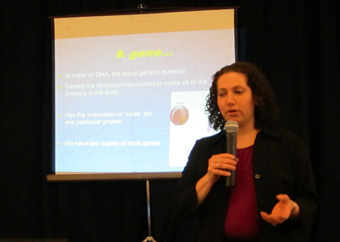Ten more ways to help your future family
Permanent link All Posts
Board meetings may not be the stuff of epic sagas, but I’ve got an important and exciting announcement for you Oy!sters about something that happened last night. The Chicago Center for Jewish Genetic Disorders has just been authorized to expand its testing panel from nine disorders to 19. That sounds nice, you say. But why? What does that mean for me?
It’s really good news. Every ethnic group in the world has some genetic mutations that increase risk for certain disorders or diseases (sickle cell disease in individuals of African descent is one; thalassemia in people of Mediterranean descent is another). Jews have a well-documented list of “our own” disorders, such as Tay-Sachs disease or familial dysautonomia (FD), which can be passed on to children with heartbreaking results. They’re not unique to Jews, but thanks to a quirk of genetics, they occur more frequently in people with Jewish backgrounds. With the pace of science and technology accelerating at exponential speed, new tests to identify these disease-causing mutations come out nearly as quickly as scientists uncover new disorders.
When the Center began offering subsidized testing in the Chicago area in 2002, we could test Ashkenazi couples and individuals for Tay-Sachs disease, Canavan disease, FD and Gaucher disease. We knew there were more disorders for which we had no tests available, but by 2006, we were able to offer screening for nine disorders. Now we’ve seen another leap forward in carrier screening technology. The ten new disorders for which we can offer testing appear in our population with similar frequencies to the disorders we already cover. Thanks to the advancements in the testing process, we should be able to easily add new disorders as tests become available. We’re also very excited about the possibility of including some tests for Sephardic disorders, which are a whole different kettle of fish from Ashkenazi disorders. While Ashkenazi disorders tend to be more uniform in the population as a whole, Sephardic disorders vary by specific country of origin. If you’re of mixed Sephardic and Ashkenazi ancestry, or if you’re not sure, our genetic counselor can help you decide on an appropriate panel.
This new technology won’t change some things. Mutation carriers are healthy individuals unaffected by the disorder itself, which means anyone of Ashkenazi Jewish descent will still need to get tested. Testing and knowing about testing can be a scary and nerve-wracking process, but it remains our best option for planning our reproductive futures. Genetic counselors are trained to help couples ready to have children figure out the best way to do that. Thankfully, that won’t be changing either.
If you want to learn more about Jewish genetic disorders, hereditary cancers, and screening and counseling options, including our subsidized education and screening programs, visit jewishgenetics.org and, if you haven’t already, sign up for our bimonthly newsletter. If you have any questions about the Center’s new expanded screening panel, including which disorders will be included, check back over the coming days and weeks for more information, or give us a call at (312) 357-4718.
So yeah: more than doubling our ability to help Jewish families have healthy children. Pretty exciting board meeting, right?



